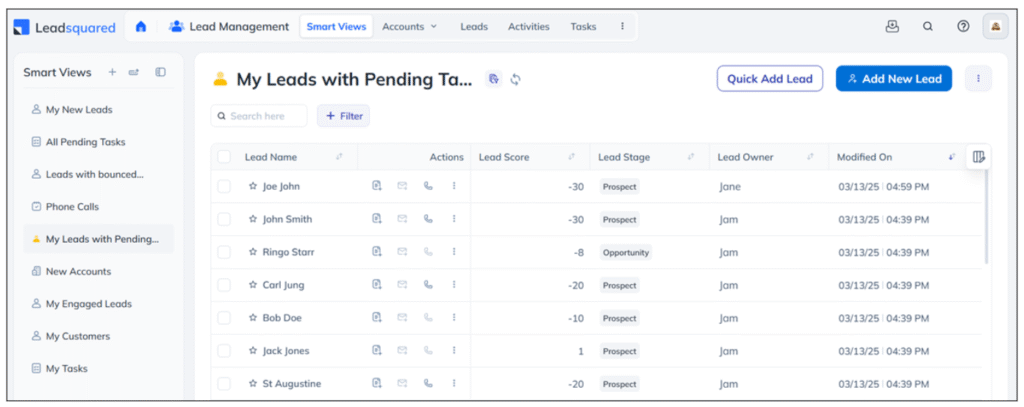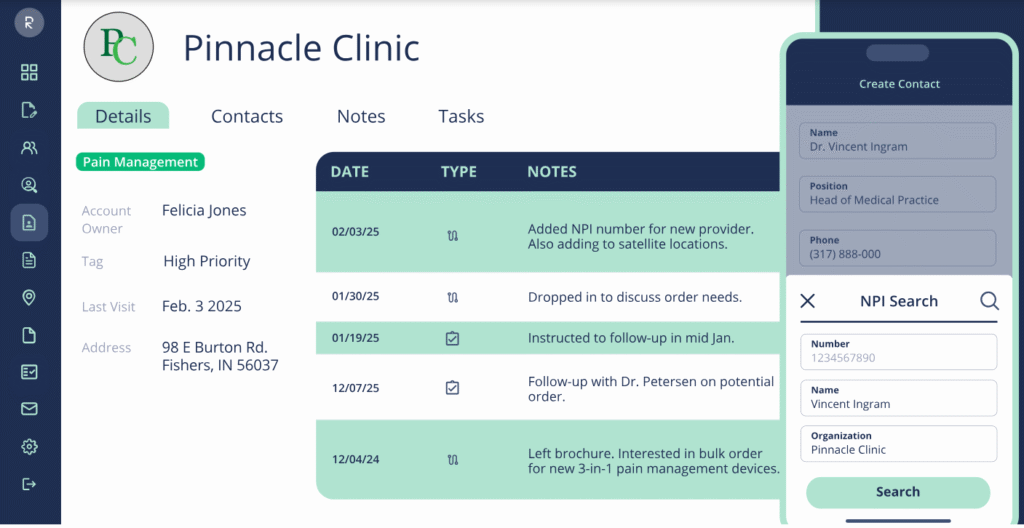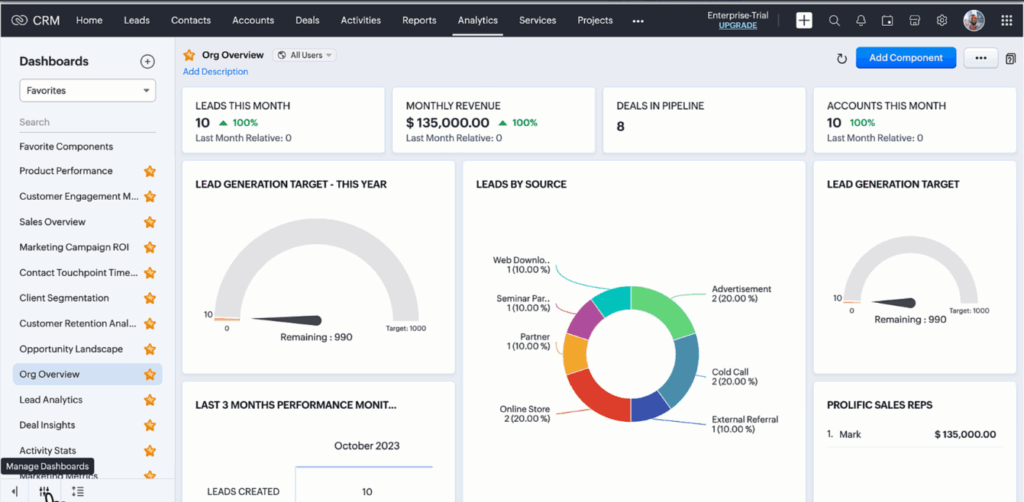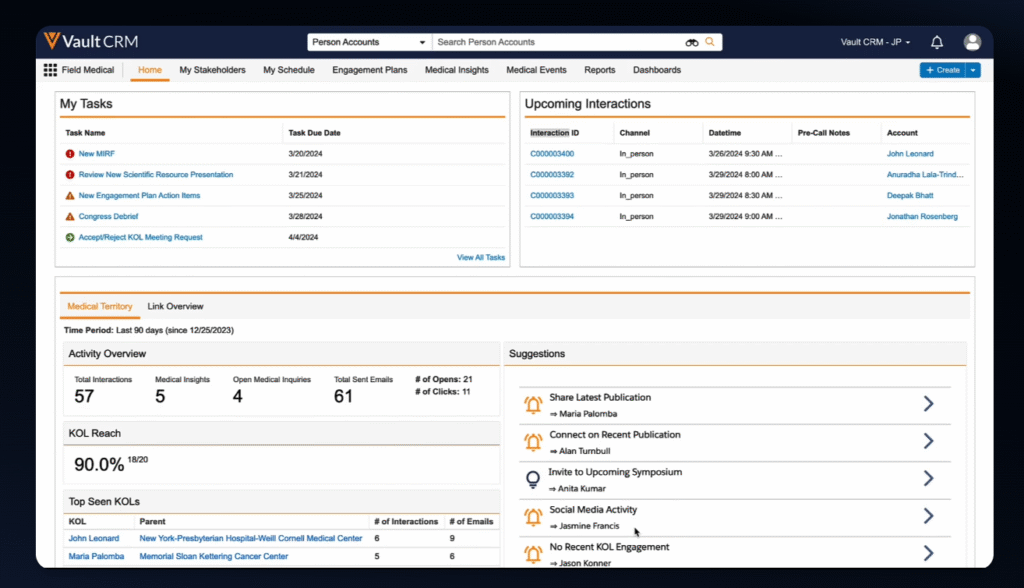- Home
- Learn
- Healthcare
- 5 Best CRM for Medical Device & Healthcare Field Sales
HEALTHCARE
5 Best CRM for Medical Device & Healthcare Field Sales
Contents
Selling medical devices or healthcare solutions is rarely straightforward. You’re not pitching to one person, but to an entire ecosystem (physicians who care about outcomes, administrators who need to watch budgets, and, compliance teams who check every single detail).
So, a single deal can involve months of evaluation and pages upon pages of compliance documentation. Reps must track which physicians are using trial units, what stage each hospital or clinic is at in its procurement process, and which products are under post-market surveillance.
A standard CRM tracks leads and opportunities, but medical device sales teams need more. They need a system that links accounts across hospitals and ties every sale to the right product and service data.
A purpose-built CRM helps sales teams manage these dependencies easily.
This article looks at the best CRMs that offer those capabilities — the ones built specifically for the complexity and accountability of healthcare and medical device sales.
As we saw, medical device and healthcare sales involves long processes and strict regulatory requirements. A CRM built for this environment handles these complexities in ways generic CRMs typically do not.
They allow sales teams to map relationships across hospitals and physician networks, capturing not just accounts but the hierarchy and influence of each stakeholder. These CRMs track interactions with healthcare professionals, including demos, trials, and post-installation visits, while maintaining a full audit trail for compliance purposes.
Provider data is often standardized using identifiers such as the NPI (National Provider Identifier), to make sure that each physician or facility is uniquely recognized.
Medical device CRMs also connect sales activity with operational and clinical data. Reps can track which devices are installed, their service and maintenance schedules, and warranty status, giving both sales and service teams a unified view of each account.
Finally, these platforms integrate with other enterprise systems like ERP, regulatory databases, and field service tools for smooth flow of data between the systems.
In short, a CRM for medical devices helps manage relationships with healthcare practices (or physicians), regulatory requirements, and product information across a complex, regulated ecosystem.
Map complex relationships across hospitals, clinics, and physician networks, helping decision-makers and influencers to guide targeted sales strategies.
Track every interaction, including demos, trials, and gifts, with audit-ready records. Incorporate NPI (National Provider Identifier) data to support reporting under regulations like the Sunshine Act and GDPR.
Link opportunities to specific devices, tracking installation, maintenance, and warranty status to support both sales and post-sales service.
Connect with ERP, regulatory, and field service platforms to maintain consistent data across sales, product, and compliance functions.
Organize accounts and territories, prioritize efforts, and monitor pipeline progress and rep activity in real time.
Analyze trials, product usage, and physician engagement to understand demand and optimize strategies.
Provide reps with real-time access to account information, device data, and compliance logs while they are in the field.
| Healthcare Sales CRM | Best Features | Ratings (G2) | Price |
| LeadSquared | Mobile-first design with offline capabilities, geo-fencing and location tracking, Automated day planners and task assignments | 4.5/5 | Pro: $60/user/month Super: $100/user/month |
| Salesforce Health Cloud | 360-degree account view, Advanced sales forecasting tools, Seamless integration with medical device inventory systems | 3.8/5 | Essentials: $25/user/month Professional: $75/user/month Enterprise: $150/user/month Developer: $300/user/month |
| RepMove CRM | Mobile-first design optimized for field sales, Integrated NPI lookup, Route optimization features | 4.9/5 | Flex: $19.99/user/month Sales pro: $49.99/user/month Accelerate: Custom pricing |
| Zoho CRM for Life Sciences | Omnichannel communication, Sales automation, 360-degree customer view | 4.2/5 | Standard: $12/user/month Professional: $20/user/month Enterprise: $35/user/month Ultimate: $50/user/month |
| Veeva CRM | AI-driven recommendations, Unified sales, marketing, and medical data, Strategic management of key accounts | 3.9/5 | Varies depending on the number of users and specific modules required |

LeadSquared is a fully HIPAA-compliant CRM built to meet the needs of medical device manufacturers and healthcare sales teams.
It provides robust tools to capture and track leads, manage appointments, and automate daily sales tasks. With its mobile app, your team can stay connected and productive in the field. Designed for scalability, it supports organizations of all sizes – ranging from small clinics to large hospital networks. Its comprehensive features cater to the unique needs of healthcare sales professionals.
Salesforce Health Cloud is a popular CRM tool for healthcare and medical device sales teams. It provides a clear view of all your accounts and can work directly with your inventory systems. Built on Salesforce’s reliable platform, it is scalable and compliant with industry standards.
One user shared that they found Salesforce’s platform to be extremely in-depth and liked the seamless integration with external applications. They also praised the responsiveness of the support team.
A user mentioned that the platform needs a lot of configuration and customization before it becomes fully functional.

RepMove is a mobile-first CRM built for field sales teams in the medical device and healthcare industries. It helps sales reps plan their routes, manage provider relationships, and keep their data updated through the mobile app. The platform includes useful tools such as NPI lookup and the ability to link providers across multiple locations.
According to a user, Repmove stands out because it provides all the tools an Account Manager might need in a single platform, including lead storage, route planning, visit tracking, and job logging.
A user mentioned that starting out with the system can feel overwhelming because of all the features and where to find them. They found some of the reporting harder to grasp.

Zoho CRM for Life Sciences is a customizable CRM solution that can support engagement between medical sales representatives and healthcare professionals. It offers features like omnichannel communication and sales automation, helping reps collaborate effortlessly.
One user shared that the CRM’s search function is excellent, allowing them to find accounts quickly with minimal input. They appreciated the messaging tools, especially the safeguards against sending messages outside allowed times or duplicating texts.
A user mentioned that the service fell short when they needed to change their Super Admin after a medical emergency. They described a long, two-week back-and-forth, with responses delayed because they were not the listed admin. Although the issue was eventually resolved, the delay meant their team couldn’t use the platform effectively, and the implementation was already behind schedule.

Veeva Vault CRM is a life sciences-specific CRM platform that brings together sales, marketing, and medical teams on a single platform. It provides a 360-degree view of healthcare professionals (HCPs) and healthcare organizations (HCOs), facilitating compliant and personalized engagement across multiple channels. With AI-powered insights and robust offline capabilities, it supports field teams in managing complex sales cycles and strategic accounts effectively.
A user mentioned that the platform is solid and highly configurable, making it well-suited for pharmaceutical sales. They noted that familiarity with Salesforce helps, and appreciated the iPad app, iRep, for being convenient and easy to use.
A user mentioned that Veeva’s pricing across its different products can be confusing. They also noted limitations in virtual detailing and pointed out that the platform isn’t optimized for devices other than iPads.
Throughout this article, we explored several specialized CRMs for medical devices and healthcare sales teams, each with their own strengths and weaknesses.
LeadSquared stands out as a solid choice for teams looking for a mobile-friendly, HIPAA-compliant CRM that combines robust workflow automation, location tracking, and analytics. It’s designed to help sales reps stay productive in the field while giving managers a clear view of territory performance and lead progression.
If you’d like to see how it could work for your team, you can schedule a quick demo to experience LeadSquared in action.
Yes. Many healthcare CRMs can connect with Electronic Health Records (EHRs), hospital databases, and inventory systems. This ensures that account and patient information stays up-to-date, reduces duplicate data entry, and lets sales teams see a complete picture without switching between multiple platforms. Integration makes it easier to coordinate with clinics and hospitals while keeping workflows smooth.
Look for a CRM that understands healthcare sales. Key features include:
Tools designed for complex hospital and physician networks.
Automated follow-ups and workflow management.
Mobile and offline access for field reps.
Reporting and analytics that show territory performance.
Strong data security and compliance with regulations like HIPAA.
These features help ensure the CRM supports your team’s specific challenges, rather than just offering generic sales tools.
CRMs can track inventory at a basic level, like monitoring stock or usage patterns, but they aren’t meant to replace dedicated inventory management systems. For tasks like order fulfillment, usage capture, and billing, you’ll typically integrate your CRM with specialized inventory software. This way, sales reps can see product availability without manually checking separate systems.
A CRM supports field reps by giving them mobile access to accounts, leads, and engagement history. They can log visits, update notes, and track follow-ups in real time — even offline. This ensures reps always have the right information on hand, saves time on admin work, and helps them focus on building relationships and closing deals.
Implementation depends on your team’s needs and the CRM’s complexity. On average, it can take a few weeks to several months. Factors include migrating data, integrating with other systems, customizing workflows, and training users. Planning and clear communication during setup can help your team start seeing benefits faster.
Yes. In medical device sales, decisions often involve multiple people — doctors, administrators, procurement teams, and so on. Specialized CRMs let you log interactions with each stakeholder, track their influence, and plan follow-ups accordingly. This ensures your team knows who to engage and when, improving the chances of closing deals.
Healthcare CRMs provide visibility into leads, pipeline stages, and account activity. Managers can see which territories are performing well and which need attention. By analyzing historical data and sales patterns, the CRM helps forecast revenue and allocate resources effectively.
Yes. A healthcare-focused CRM such as LeadSquared logs every interaction, communication, and workflow action. This creates a clear audit trail for regulatory compliance. During inspections or audits, your team can quickly produce reports showing how interactions were handled, demonstrating adherence to rules like HIPAA.
Most specialized CRMs are highly customizable. You can adjust workflows, dashboards, data fields, and reports to match your team’s processes. Whether your team focuses on hospitals, clinics, or physician networks, the CRM can be tailored to match account structures, approval processes, and reporting requirements.
Yes. Many healthcare CRMs integrate with email marketing platforms, marketing automation tools, or event management systems. This allows sales and marketing teams to coordinate campaigns, track engagement from physicians or hospitals, and follow up on leads generated from webinars, conferences, or emails — all within the CRM.